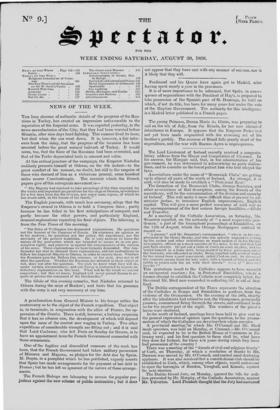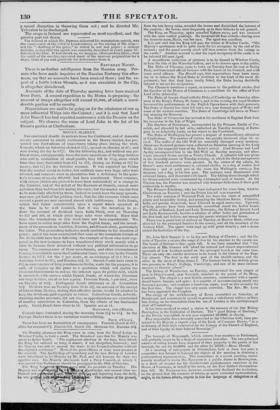NEWS OF THE WEEK.
THE long absence of authentic details of the progress of the Rus- sians in Turkey, has created an impression unfavourable to the reputation of the Imperial arms. It was reported yesterday, in the news-manufactories of the City, that they had been worsted before Shumla, after nine days hard fighting. This rumour lived its hour, but died when the sun went down. It is, however, a fair infer- ence from the delay, that the progress of the invasion has been arrested before the great natural bulwark of Turkey. It would seem, too, that the force of the Russians had been overrated, and that of the Turks depreciated both in amount and value.
At this critical juncture of the campaign, the Emperor Nicholas suddenly presents himself at Odessa, on the 8th instant—to the great comfort of his consort, no doubt, but still to the surprise of those who deemed of him as a victorious general, some hundred miles nearer Constantinople. The account which the French papers give of this retrograde movement is-
" His Majesty bad resolved to take advantage of the time required for the works and important preparations for the siege of Shumla, to withdraw for a few days from the din of arms, and enjoy some repose, of which he has much need, in the bosom of his family."
The English journals, with much less ceremony, allege that the Emperor's errand to Odessa is to hold a Congress there ; partly because he has failed in his first anticipations of conquest, and partly because the other powers, and particularly England, demand explanations regarding his final objects. The following is from the New Times of this morning.
"The Duke of Wellington has demanded explanations. He questions not the honour of the Emperor of Russia. He expresses no opinion as to his motives ; he questions not the policy, the expediency, nor the necessity of the present hostilities. He is only anxious to know the nature of the guarantees which are intended to secure to us our pre- scriptive rights, and preserve us against the consequences of the success of his arms. These explanations we have formally demanded. Our Am- bassador has sent to demand these explanations, and has instructions to follow his Imperial Majesty to Odessa, in order to receive them. Whether the Russians pass the Balkan this summer, or the next, does not at all alter the question. Whether the Russians arc defeated in their object or not, does not alter the question. We wish to know what they will do, under certain circumstances, and our Envoy is instructed to require sa- tisfactory explanations on this head. What will be the result we cannot conjecture ; but this we know, England will never permit Russia to ac- quire or possess the command of the Dardanelles."
The Globe of this evening remarks, that Nicholas returned to Odessa during the siege of Brailosv'; and hints that his presence with the army is not very necessary at any time.
A proclamation from General Maison to his troops settles the controversy as to the object of the French expedition.. That object is, to terminate, in conjunction with the allies of France, the op- pression of the Greeks. There is still, however, a lurking suspicion that it has an ulterior aim, the development of which will depend upon the issue of . the contest now waging in Turkey. Two other .expeditions of considerable strength are fitting out ; and it is said that Lord Cochrane, who left Paris on Sunday for Greece, is to have an appointment from the French Government connected with these armaments.
One of the fugitive and discredited rumours of the week has been, that the French Government had taken military possession of Minorca and Majorca, as pledges for the debt due by Spain. M. Dupin, in a pamphlet which he has published, vaguely asserts that Spain has made arrangements for the payment of her debt to France ; but he has left us ignorant of the nature of these arrange- ments.
The French Bishops are labouring to arouse the popular pre- judices against the new scheme of public instruction; but it does
not appear that they have met with any manner of success, nor is it likely that they will.
Ferdinand and his Queen have again got to Madrid, after having spent nearly a year in the provinces.
It is of more importance to be informed, that Spain, in conse- quence of negociations with the President of Hayti, is prepared to take possession of the Spanish part of St. Domingo, its hold on which, if not its title, has been for many years lost under the rule of the Haytian Government. The authority for this intelligence is a Madrid letter published in a French paper.
The young Princess, Donna Maria da Gloria, was preparing to sail on the 6th of July, from the Brazils, for her now alienated inheritance in Europe. It appears that the Emperor Pedro had not yet been made acquainted with the crowning act of his brother's perfidy. The revenue of Brazil falls greatly short of the expenditure, and the war with Buenos' Ayres is unprosperous.
The Lord Lieutenant of Ireland recently received a congratu- latory address from the Mayor and Corporation of Clonmel. his answer, the Marquis said, that, in the administration of his government, he was determined to acknowledge no party distinc- tions, and to consider as the truest patriot him who best obeyed the laws.
Associations under the name of " Brunswick Clubs" are gettinE,, up in almost all parts of the north of Ireland. An attempt, it is said, will also be made to establish a "Protestant Rent."
The formation of the Brunswick Clubs, Orange Societies, and other associations of that description, among the friends of the ascendancy, will be the consummation of the division and anarchy of Ireland. This will make it more difficult than at present to ad- minister justice, to introduce English improvements, English capital. This will give a more perfect assurance of civil war as the accompaniment ofthe first serious foreign hostilities.–. Globe and Traveller.
At a meeting of the Catholic Association, on Saturday, Mr. Staunton reported, on the authority of " a most respectable gen- tleman," a part of the triumphant proceedings at Enniskillen, on the 12th of August, which the Orange Newspapers omitted to record
A person," said Mr. Staunton's correspondent, "who is in the em- ployment of Sir Henry Brooke, and who was actively engaged in gettina: up the arches and other exhibitions so much spoken of in the Orange newspapers, offered up a mock sacrifice of the mass, to the idol that had just been erected. He got out a table of which he made an altar, and in- vested himself in a linen shirt, being assisted by three policemen out uf the barracks, who officiated as clerks. Being supplied with a tub of water by the crowd from a pool convenient, called Cool-na -cart, he showered the contents among them for holy water, with a branch of laurel, and the rabble in return rent the air with their shouts." Cries " _Horrible! horrible !"
This gratuitous insult to the Catholics' appears to have wrought an unexpected reaction ; for, in Protestant Enniskillen, where a former attempt to establish the Catholic rent completely failed, the Reverend Mr. Sheil now succeeded in collecting 56/. ill aid of that fund.
The Dublin correspondent of the Times represents the situation of the Catholics in Tempo and Enniskillen as perilous, from the violence of the Orangemen. On the evening of the 20th, shortly after the inhabitants had retired to rest, the Orangemen, principally yeomen, commenced firing through the streets, and continued to do so for the greater part of the night. The windows of the priest's house were shattered.
In the south of Ireland, meetings have been held to give vent to the general expression of opinion upon the question, to the promo- motion of which the Catholics are devoting their whole energies.
A provincial meeting,"at which Mr. O'Connell and Mr. Shell -made speeches, was held on Monday, at Clonmel.—Mr. O'Connell said, he expected to be in the British House of Commons in Fe- bruary next ; and his first question to them shall be, what have they done for Ireland, for these 636 years during which they have had possession of the country ?
There was a meeting of the "friends of civil and religious liberty" at Cork, on Thursday, at which a resolution of thanks to Mr. Dawson was moved by Mr. O'Connell, and carried amid deafenino- applause. It was also resolved that a constitutional club should be established in Cork, which, among other objects, would endeavour to open the boroughs of Bandon, Youghall, and Kinsale, against the next election.
The Dublin Grand Jury, on Monday, ignored the bills for sedi- tion presented by Mr. Murphy, of the Catholic Association, against
111r. Yelverton, Lord Plunkett thought that the Jury had exercised
a sound discretion in throwing them out ; and he directed Mr. Yelverton to be discharged. The crops in Ireland are represented- as most excellent, and the greater part cut down. The festival at which Mr. Dawson delivered his recantation-speech, was the anniversary of the rebief of Londonderry, or the raising of the siege— not the "shutting of the gates," as stated in our last paper ; a strange mistake, seeing that the epoch was correctly described in every paper he.. fore us at the time. It had struck us, we imagine, (disregarding dates,) that the spirit of the meeting savoured more of the anxious preparation for a siege, than of joy and gratitude for deliverance from it.
SATURDAY NIGHT.
There is no further intelligence from the Russian army. Per- sons who have made inquiries at the Russian Embassy this after- noon, say that no accounts have been received there ; and the re- port of a battle before Shumla, as it was circulated in the City, is altogether disbelieved.
Accounts of the date of' Thursday morning have been received from Paris. A second expedition to the Morea is preparing : the amount of troops altogether will exceed 25,000, of which a consi- derable portion will be cavalry.
Negociations are said to be going on for the admission of one or more influential Whigs into the Cabinet ; and it is said that Lord John Russell has had repeated conferences with the Premier on the subject. We observe the name of Lord John in the list of his Grace's parties at Cheltenham.



















